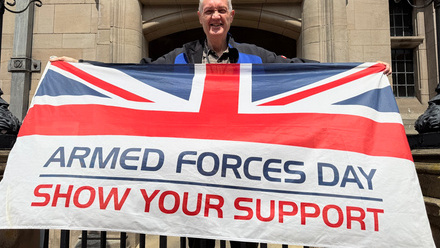Backing those who serve: Rebecca Kirk on why the Armed Forces matter to business and society

For Rebecca Kirk (pictured), Partner at HCR Law and Head of Defence, Infrastructure and National Security, the role of the Armed Forces goes far beyond defence — it’s fundamental to national resilience.
As a long-standing advocate for closer links between defence and industry, Rebecca plays an active role in the West Midlands through the Regional Employer Engagement Group (REEG) and the West Midlands Reserve Forces and Cadets Association (WMRFCA).
She shares her perspective on the growing importance of the Armed Forces Covenant, how businesses benefit from supporting the Armed Forces community, and the opportunities ahead for strengthening collaboration between defence and business.
Can you tell us about your role and how you're involved in Armed Forces engagement across the West Midlands?
I am involved in Armed Forces engagement in numerous ways.
I sit as a member of the West Midlands Regional Employer Engagement Group (REEG) which is a regional forum made up of senior armed forces personnel, representatives from the West Midlands Reserve Forces and Cadets Association (WMRFCA) and employers, to share best practice, advocate on behalf of the Armed Forces Covenant and Armed Forces community and, ultimately, help build and maintain relationships between Defence and employers in the region, for mutual benefit.
I am also a member of the WMRFCA, which is the organisation responsible for supporting and advocating for reservists and cadet forces across the West Midlands, including recruitment, public relations and estate management.
They are also responsible for employer engagement in the region.
Both as part of my role as a business leader and employment lawyer and in a personal capacity as a member of the Armed Forces community, I regularly speak at events about the benefits of employing members of the Armed Forces community, the purpose of the Armed Forces Covenant and the crucial importance of the relationship between defence and industry.
I also provide advice to employers looking to sign the Armed Forces Covenant or to move through the Employer Recognition Scheme.
In your view, what are the biggest misconceptions businesses have about hiring or supporting service personnel?
I think, over time, the misconceptions have reduced, and more and more businesses understand the innumerable benefit of employing or otherwise supporting service personnel.
Where misconceptions remain, however, it is generally the misconception that, in hiring or supporting Armed Forces personnel, be they service leavers, reservists, adult cadet force volunteers or members of the wider armed forces community, such as military spouses, there will be an unrecoverable “cost” to the business, be that in lost working time during a reservist deployment, additional management time in supporting an injured veteran or dealing with perceived unreliability in employing a military spouse.
The idea of a net loss to the business could not be further from the truth.
In my experience, businesses who employ or otherwise support service personnel almost without exception, consider those personnel to be valuable assets to their business.
Members of the Armed Forces community are highly skilled, disciplined, motivated and resilient.
They perform well under pressure, are used to juggling numerous demands and come with great leadership skills.
They also often embody the core values of any good business, such as integrity, honesty and accountability.
Are there particular industries or types of businesses in the West Midlands that are leading the way in this space?
There are several industries which are leading the way when it comes to supporting the Armed Forces community, in particular by employing service personnel.
Inevitably, defence and aerospace businesses often immediately recognise the transferrable skills gained from service in the Armed Forces and actively recruit from that talent pool.
As such, they go a long way in supporting members of the community in order to attract and retain talent.
However, other industries such as manufacturing, engineering, automotive and cyber and digital also understand the value that members of the Armed Forces bring to their sectors.
Looking ahead, what are the biggest opportunities or priorities for building better links between defence and business?
In the Strategic Defence Review (SDR), which was published on 2 June 2025 the Government set out what it considers to be a landmark shift in the UK’s approach to defence and deterrence.
Three of the five pillars of the SDR are UK Innovation, Engine for Growth and a whole of society approach to defence.
As part of those strategic priorities, the government announced significant investment for UK companies, new job opportunities and, for the first time in any SDR, mentioned the RFCAs and their role in ensuring that wider society understands what the armed force actually do and their crucial contribution to society, our way of life and our national resilience.
If the intent of the SDR is realised, I think the three pillars I have mentioned, together with a wider understanding of the need for national resilience, represent the biggest opportunity for better links between defence and business.
What would you like people — especially business leaders — to reflect on during Armed Forces Week?
I would like businesses to focus on two things – the critical importance of our Armed Forces to our national resilience and, secondly, the contribution members of the Armed Forces community make to industry.
Often, during Armed Forces week, we focus on the fact that members of the Armed Forces do a job in which they are willing to give their life for the protection of others.
In extremis, of course, that is true.
What is often overlooked or misunderstood, however, are the (thankfully) far smaller, but far more universal commitments and sacrifices made by members of our Armed Forces every day, in order to ensure they deliver in their role (and, often, any other role they are given) and the skills they have as a result.
Whilst the understandable lens through which we view our Armed Forces is often on one of war fighting, our Armed Forces are so much more than that and the skills and personal attributes they have are valuable to any business.
With Birmingham set to host the Invictus Games in 2027, what do you think the impact of the event could be — for the city, for veterans, and for the wider business community?
I am thrilled that Birmingham will be hosting the Invictus Games in 2027 and that we will have an opportunity to show the world everything that Birmingham has to offer, whilst also encouraging a greater international understanding of and respect for those who serve their country.
Whilst the Invictus Games will of course be inspiring and will highlight the strength, resilience and determination of the individual athletes and the power of sport, I think the far more impactful and lasting legacy of the games in Birmingham, will be from the strong positive integration between the Armed Forces, businesses and the wider community which will be fostered as a result of the games.



